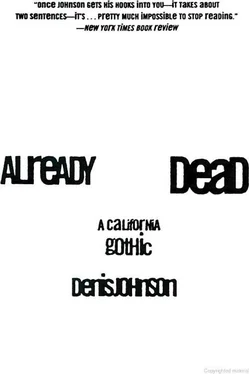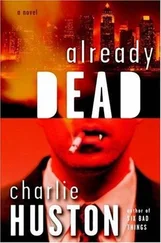That’s all. So settle down.”
“Are you one of those people,” Nelson asked the doctor, leaning over him, “who think they know what they’re doing but really don’t?” His face was three inches from the doctor’s. Schooner could only lower his own gaze. “Show some respect for the occasion,” he mumbled, clearly embarrassed. “Show a little sensitivity.” Navarro couldn’t stand it. “Maybe I’ll have a look around,” he announced, talking mainly to the woman. But she didn’t get it. “Ms.
Winslow? I’ll need your permission, if you don’t mind.”
“That’s fine,” Donna said.
“It’s just a good idea, when there’s been a death, sometimes,” Schooner assured her, standing up now from his seat.
“That’s just fine,” she repeated.
Navarro followed the doctor through the living room and up a staircase with a turn in it, then a few paces along a hallway and into a lightless bedroom that smelled of age and illness.
“The cancer started in his colon.” Schooner turned on a bedside lamp.
The corpse lay in a hospital bed with the blanket drawn up over its head. Schooner gripped the hem, flipped it down to expose the face for a second — Navarro was looking elsewhere, looking around the room — and covered it over again.
“Why am I here?” Navarro asked.
“Well, he was out of bed.”
“At the time of death.”
“Yessir, just here beside the bed, they tell me.”
“And who put him back?”
“The son did — Bill. And Donna helped, as I understand it.”
“Does that seem suspicious?”
“Nah. Your time comes wherever you are. He voided in the bed, but there was also urine on the floor. He was often incontinent,” Schooner explained, “but he refused to be catheterized.” Already Dead / 151
Navarro spoke with a certain gruffness that generally worked to cover the kind of confusion he was feeling right now: “I don’t make the deduction here. I mean about urine and so on.”
“He was pissing his bed, started for the john, and dropped dead on the floor. And finished pissing.”
“He had colon cancer, right? You got a specific cause?”
“Something coronary, probably.”
“Heart attack?”
“Nah, there wasn’t enough heart left to attack. It just ran down and stopped, more likely.”
“Well then, but—”
“He had about eleven holes in his pump.”
“But what about the colon thing?”
“That too.”
“So, cancer, heart — shouldn’t he have been hospitalized?”
“ Should ’ve been, definitely. Should’ve been in CCU the last six months. Should’ve junked three yards of lower intestine. Should’ve been hooked to a gallon of painkiller.”
“And you wanted me?”
“If he dies out of bed, yessir.”
“Because you’re not sure as to cause?”
“Because I had a lot of trouble on one of these many years back. So now if anybody under my care goes down while away from his or her bed — well.”
“You don’t just toss him in a casket and say adios — not unless I sign off on it.”
“Right. Roger that, as you men say. But if you say so, I can have him in the funeral home in forty-five minutes.”
“On the other hand, if I tell you to ship him to Ukiah for an autopsy, which might take — how long?”
“Which might take a week or more, and would certainly lather up the relatives—”
“Right. I’d take the heat.”
“I guess taking the heat is partly what you’re paid for.”
“Almost entirely what I’m paid for, I’ve been thinking lately.”
“Well, give yourself a raise,” Schooner said.
“Yeah. Roger that.”
Navarro wandered over to the window. It was wide open, and a little rain had wet the sill. He listened to the sea, realized he wasn’t 152 / Denis Johnson
coming to a decision — wasn’t even thinking, if the truth were known.
“Well,” he said, “let’s hear what the wife thinks.” He stood staring at the bed as Schooner went out to stand at the top of the stairs and call down for Donna Winslow. By the small round depression in the bedclothes covering the corpse’s head, Navarro figured that at this moment Nelson Fairchild’s mouth was wide open. Navarro felt a brief, crashing vertigo. Nothing to do with corpses, because he’d seen plenty, but more to do with the force, the jolt, of suddenly remembering that just an hour ago he’d been making love with Mo.
He noticed the electric cord dangling beside the mechanical bed — the button that worked it up and down. He reached for it, held it in his hand, and would have indulged a sudden macabre impulse to make the corpse sit up and the shroud fall away from its face; but he heard the others on the stairs. He stepped away from the bed as the doctor came back with the woman of the house, Donna Winslow.
Donna Winslow took three steps into the room, looked at her lover’s shape under the sheets, and sighed.
“Did he like the window open?” Navarro asked.
“Sometimes.”
“Even in the rain?”
“I don’t think the storm started till after…so no one noticed.”
“Dr. Schooner says he was on the floor when you found him.”
“Bill and I found him together. Something made Bill come,” she said,
“in the middle of the night.”
“And this is his urine here, right?”
“Oh,” she said, grabbing a box of tissues from the bedside table, kneeling—“oh, let me just”—and she sopped it up with a succession of wadded napkins, tossing them in a wicker wastebasket, while the two men stared down at her.
“Who put him back in bed?”
“We both did. Bill did mostly, I guess.”
“Here — maybe we should adjourn to another room,” Dr. Schooner suggested.
“In a minute.” Navarro knelt by the bed and picked up a pillow from the floor beside it — bare, no slipcase. He asked the wife, “Would you have been the only one in the house around the time of”—he sought a word other than death but couldn’t find one—“when his time came?” Already Dead / 153
“I was alone downstairs.”
“Did you strip this pillow?”
“I don’t think so,” she said.
“Where’s the pillowcase? Any idea?”
“The pillowcase?”
“Just curious.”
“The hamper’s in the bathroom. That’d be the logical place, I guess.”
“Could Nelson have put it there? Did he have the strength?” She came closer to the corpse and pulled back the sheet to bare the astonished death mask — blue-gray, openmouthed, with deep-sunk, wide-open, porcelain eyes — and said, “This is Nelson Fairchild, Sr. He could’ve done anything at just about any time. If he wanted to right now he could probably jump up and spit in your eye. There’d probably be no truer epitaph than that.”
She didn’t replace the blankets until Schooner cleared his throat and said, “Thank you, Donna.”
“Let me just peek in the bathroom a second,” Navarro said.
“Whatever you have to do, Officer,” she said.
Schooner directed him across the hall, and he went into a small chamber and found the lightswitch and then the clothes hamper. Among the musty pyjamas and towels, all of which felt like artifacts because in them lingered the life that had just been lost, he found the pillowcase.
Holding it up before the light, he examined a patch of half-dried saliva and mucus in the center of the white material, of a size and shape, he would have wagered, that nearly matched the corpse’s open mouth.
He bunched it up and threw it back into the dirty laundry.
When he came out, Donna Winslow was gone. But Schooner was still hanging around. “What’s all this about a pillow?” he asked, following Navarro down the stairs.
Читать дальше












